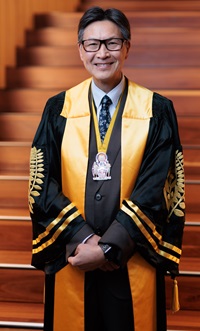2025 | Volume 26 | Issue 3

I'm incredibly proud to be serving you as President over the next 12 months. To say the last two years as your vice president has been challenging would be an understatement, but we're emerging in a better place and change is invigorating. In that role, I was honoured to support President Kerin Fielding. I especially want to acknowledge her steadfast leadership and thank you, the members, for keeping faith with us as we navigated those challenging times. Now, it’s time to steady our footing, build on our progress, and re-engage with renewed purpose.
It's a privilege to lead at a time when both opportunity and challenge define the surgical landscape in Australia and Aotearoa New Zealand.

Rising to meet the moment
Health systems are under pressure on both sides of the Tasman. We're dealing with growing and ageing populations, ever-increasing demands that will only escalate into the future, and health sector workforce shortages in every domain that continue to stretch resources in public and private sectors alike. Yet in both countries, the College remains focused on what matters most—advocating for safe, high-quality surgical care and ensuring the surgical voice is heard with patient care at the centre.
In Aotearoa New Zealand, our National Committee is actively engaging with decision-makers as the government explores using private capacity to ease pressure on the public system. We're ensuring any changes serve the best interests of surgeons and their patients without compromising quality and accessibility of care. We're also working to maintain sufficient training opportunities for our future surgeons under an outsourcing model. Australia has experience with various outsourcing models across states and territories, and RACS has developed principles we believe should guide such approaches. We also continue advocating for an adequately provisioned and funded public health service that would reduce the need for such models.
Navigating change together
The recent financial challenges facing Healthscope—our second-largest private hospital provider—have raised serious concerns, especially for the many people employed across its hospitals, patients in care with scheduled procedures, and our Fellows whose work has supported these facilities. Thankfully, reassurances have been made regarding continuity of care, though it's clear there will be no government bailout. These events highlight both the fragility of our systems and the risks the community faces when profit-driven motives take precedence over patient care. We can only hope a suitable operator emerges who will manage patient care and profitability sustainably and ethically. While this remains a commercial and regulatory matter, RACS will be closely monitoring the situation and stands ready to advocate for our members and patients should the need arise.
Embracing our surgical family
Another important issue is expedited pathways for Specialist International Medical Graduates (SIMGs). Some of our closest and most esteemed colleagues are internationally trained, and many are the lynchpin for services to rural and remote regions. We know in Aotearoa New Zealand for instance, there are many highly skilled surgeons who embrace the same values as our College but are not Fellows. RACS is determined to support all of our surgical fraternity and wants to assist specialists in obtaining pathways to Fellowship. We are so much stronger collectively. We can and should do more to support our locally trained and internationally obtained members in improving pathways wherever possible.
However, we've been clear about our position on expedited pathways: patient safety and rigorous standards must be upheld, and specialist colleges must have oversight to ensure the best possible care for the community.
The College is examining our own SIMG assessment processes to ensure they remain robust, fair, and practical. We've made recommendations regarding expedited pathways and hope to work collaboratively with the Medical Board of Australia, Te Kaunihera Rata o Aotearoa Medical Council of New Zealand, and health ministries to uphold these important values.
At the same time, we recognise the urgent need for workforce solutions, particularly in regional and rural areas. This isn't simply a numbers game—the real challenge lies in equitable distribution, ensuring rural, regional, and remote communities have reliable access to surgical services. It's complex and requires collaboration across colleges, governments, hospitals, and beyond.
Stronger together
RACS, working closely with our societies, has many challenges but we are not facing them alone. The Council of Presidents of Medical Colleges, for example, represents medical colleges in Australia and Aotearoa New Zealand and there is a shared vision and intent to preserve a structure of self professionally led specialist education, training and assessment. This is a model recognised internationally as producing medical specialists of the highest consistent quality. We are stronger when we speak together—and more effective when we act together.
As I begin my term, you’ll see this shift in focus to a more outward-looking College. We’ve come through a period of internal reflection and renewal. Now, it’s time to lift our gaze, make our voice heard and build partnerships with others who share our vision for safe, sustainable, and equitable healthcare systems.
The future of surgery is shaped by all of us working together, and I'm excited about what we can achieve when we combine our expertise, passion, and shared commitment to excellence in surgical care.
Warm regards,
Professor Owen Ung
President
Chair Governance Committee
Chair International Engagement